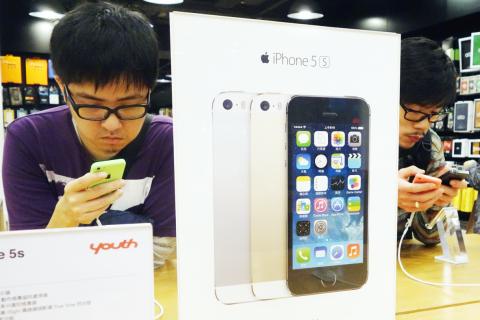The Fair Trade Commission (FTC) yesterday fined Apple Asia Ltd NT$20 million (US$666,220) for restricting local telecommunications companies to set their sale prices of iPhones — a move that inhibits competition.
“The commission’s ruling makes Taiwan the first country to fine Apple Inc’s subsidiaries concerning their handset distributors’ pricing, while there is a similar ongoing investigation concerning Apple Inc for impeding competition in Europe,” Fair Trade Commission Vice Chairman Sun Lih-chyun (孫立群) said.
Apple Asia Inc has to stop the practice immediately once the company receives official documentation from the government, otherwise the company may be subject to another fine of NT$100,000 up to NT$50 million, Sun said.

Photo: Lo Pei-der, Taipei Times
“If Apple Asia hired local companies to provide services and sell iPhones, the company can set prices for them,” Sun said. “However, based on the contracts between Apple and their handset distributors, the company actually sold its iPhones to local companies, therefore local companies should have the right to set prices themselves.”
According to Sun, Apple Asia violated Article 18 of the Fair Trade Act (公平交易法), which states that when an enterprise supplies goods to its trading counterparts for resale to a third party, the trading counterparts shall “be allowed to decide their resale prices freely.”
The contracts between Apple Asia and Chunghwa Telecom Co (中華電信), Taiwan Mobile Co (台灣大哥大) and Far EasTone Telecommunications Co (遠傳電信) showed that Apple Asia demanded the three companies to send their iPhone pricing plans for its review, Sun said.
In e-mails between high-ranking officials of the companies, the commission also found evidence that Apple Asia required local companies to adjust plans they proposed concerning the prices for iPhones, the subsidies they offer for iPhones with contracts, and the price difference between the iPhone 4S and the iPhone 5, he said.
The contracts between Apple Asia and the three local companies also stipulated that the conditions they set for buying iPhones, such as subsidies these companies offer for buying iPhones with contracts, cannot be lower than those of their competitors, Sun said.
The three local companies also needed to submit their promotion plans for iPhones for the approval and confirmation of Apple Asia, he added.
Sun said the commission investigated three other smartphone makers, HTC Corp (宏達電), Sony Corp and Samsung Electronics Taiwan, but none of them has reached similar contracts with local service providers.
The three companies account for 80 percent of the local market for telecommunication services, Sun said, adding that 90 percent of iPhones sold in Taiwan are from the three companies, with most of the headsets sold with contracts.
Sales of iPhones in Taiwan account for 1 percent of iPhones sold by Apple Inc around the world, Sun said.
The commission established the case in April this year when FTC Chairman Wu Shiow-Ming (吳秀明) was urged by legislators to investigate why all local mobile service providers had set the same prices for iPhones, Sun said.

INVESTIGATION: The case is the latest instance of a DPP figure being implicated in an espionage network accused of allegedly leaking information to Chinese intelligence Democratic Progressive Party (DPP) member Ho Jen-chieh (何仁傑) was detained and held incommunicado yesterday on suspicion of spying for China during his tenure as assistant to then-minister of foreign affairs Joseph Wu (吳釗燮). The Taipei District Prosecutors’ Office said Ho was implicated during its investigation into alleged spying activities by former Presidential Office consultant Wu Shang-yu (吳尚雨). Prosecutors said there is reason to believe Ho breached the National Security Act (國家安全法) by leaking classified Ministry of Foreign Affairs information to Chinese intelligence. Following interrogation, prosecutors petitioned the Taipei District Court to detain Ho, citing concerns over potential collusion or tampering of evidence. The

‘FORM OF PROTEST’: The German Institute Taipei said it was ‘shocked’ to see Nazi symbolism used in connection with political aims as it condemned the incident Sung Chien-liang (宋建樑), who led efforts to recall Democratic Progressive Party (DPP) Legislator Lee Kun-cheng (李坤城), was released on bail of NT$80,000 yesterday amid an outcry over a Nazi armband he wore to questioning the night before. Sung arrived at the New Taipei City District Prosecutors’ Office for questioning in a recall petition forgery case on Tuesday night wearing a red armband bearing a swastika, carrying a copy of Adolf Hitler’s Mein Kampf and giving a Nazi salute. Sung left the building at 1:15am without the armband and apparently covering the book with a coat. This is a serious international scandal and Chinese

Seventy percent of middle and elementary schools now conduct English classes entirely in English, the Ministry of Education said, as it encourages schools nationwide to adopt this practice Minister of Education (MOE) Cheng Ying-yao (鄭英耀) is scheduled to present a report on the government’s bilingual education policy to the Legislative Yuan’s Education and Culture Committee today. The report would outline strategies aimed at expanding access to education, reducing regional disparities and improving talent cultivation. Implementation of bilingual education policies has varied across local governments, occasionally drawing public criticism. For example, some schools have required teachers of non-English subjects to pass English proficiency

TRADE: The premier pledged safeguards on ‘Made in Taiwan’ labeling, anti-dumping measures and stricter export controls to strengthen its position in trade talks Products labeled “made in Taiwan” must be genuinely made in Taiwan, Premier Cho Jung-tai (卓榮泰) said yesterday, vowing to enforce strict safeguards against “origin laundering” and initiate anti-dumping investigations to prevent China dumping its products in Taiwan. Cho made the remarks in a discussion session with representatives from industries in Kaohsiung. In response to the US government’s recent announcement of “reciprocal” tariffs on its trading partners, President William Lai (賴清德) and Cho last week began a series of consultations with industry leaders nationwide to gather feedback and address concerns. Taiwanese and US officials held a videoconference on Friday evening to discuss the